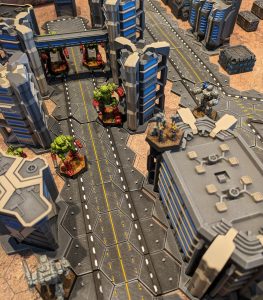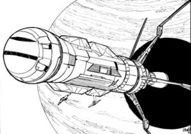Quetzalcoatl (JumpShip class)
Sarna News

- HEXTECH Review - Wave 3 Brings More Urban Options To Your Battlefield
- Your BattleTech News Round-Up For March, 2024
- Crashing 'Mechs With Jennifer Brozek, Author Of The Rogue Academy Trilogy
- Getting The Word Out With Rem Alternis, Catalyst Community & Marketing Director
- Bad 'Mechs - Yeoman
- Read more →
- This article is about the JumpShip class. For other uses, see Quetzalcoatl.

| |
| Quetzalcoatl | |
|---|---|
| Production information | |
| Manufacturer | |
| Use | Carrier |
| Tech Base | Inner Sphere |
| Cost | ? |
| Introduced | 2876 |
| Technical specifications | |
| Mass | 90,000 tons |
| Length | 273 meters |
| Sail Diameter | 890 meters |
| Fuel | 52 tons (520) |
| Burn Rate | 9.77 |
| Top Thrust | 0.1 G |
| Sail Integrity | 3 |
| KF Drive Integrity | 3 |
| LF Battery | None |
| Armament | None |
| Armor | 38.5 tons |
| DropShip Capacity | 0 |
| Crew | 17 crew, 28 passengers (pilots and technicians) |
| Grav Decks | None |
| Escape Pods/Life Boats | None |
| Heat Sinks | 91 |
| Structural Integrity | 1 |
| BV (1.0) | 549[1] |
Contents
Description[edit]
The Quetzalcoatl-class of JumpShips began its life as a field refit variant of the Scout-class and is therefore also known as the Quetzalcoatl-Scout; it has since come to be regarded as a class of its own.
Instead of a docking hardpoint, Quetzalcoatl-class vessels feature fighter bays, allowing them to serve as mobile aerospace fighter bases and auxiliary carriers. In this fashion, they could arguably be called Jolly Rogers for being armed "civilian" JumpShips.
The exact modifications to the original Quetzalcoatl remain uncertain; this ship reportedly had room for twenty aerospace fighters.[2] The established standard refit to the Quetzalcoatl-Scout class circa 3026 would be to remove the hardpoint, small craft bay and some other components from a 90,000 ton Scout to install twelve fighter cubicles, although such ships could reportedly support up to twenty fighters when operating them in shifts.[1]
Like its parent design, the Quetzalcoatl lacks a grav deck and can only produce gravity through acceleration; this requires significant amounts of fuel on extended missions. It was not specified if the Quetzalcoatl class shares the known advantages of the Scout class—namely, a tiny emergence signature, a faster quick-recharge rate for the K-F Drive, faster jump sail deployment, 0.2g acceleration, an up-to-date medical bay and bridge, and backup generators for the life support system.
The first vessel to undergo such a refit was the Capellan Confederation's Quetzalcoatl, after it had suffered crippling damage to its hardpoint in an enemy boarding attempt. The refit proved successful and several other ships have been refitted in this way, spawning the new class. By 3067, more capable DropShips with better armor, firepower and fighter capacity had lowered the demand for Quetzalcoatl conversions.
Armament, Cargo, and Discussion of Fighter Capacity[edit]
The standard refit converts the cargo space, small craft bay and docking hardpoint of a 90,000 ton Scout into twelve fighter cubicles and 327 tons of cargo space. Aside from the aerospace bays the vessel itself is unarmed.
Despite the in-fluff assertion that the ship could operate groups of up to 20 fighters as long as they operated in shifts, this seems highly impractical for a number of reasons. Firstly, such an arrangement is not supported by in-game rules. Secondly, even with shifts, such continuous operation would likely severely strain aerospace fighters and their pilots over time. Thirdly, the ability to operate craft in shifts hardly seems to be a characteristic that would be limited to this and only this vessel. Fourthly and most importantly, it is unclear how the Quetzalcoatl, much less any other ship in similar circumstance, would recover and accommodate these "overflow" units every time it intended to jump.
Since leaving some of its fighters stranded behind would defeat the entire purpose of the ship, it is hard to envision a circumstance in which it would ever be feasible to use this ship in such a manner. Most likely, reference to such capability is either an error, editorial license, or deliberate misdirection.
Variants[edit]
Since the Quetzalcoatl-class is essentially a refit, it is conceivable that customized variants exist that retain the small craft bay or mount additional small craft bays instead of some or all of the fighter bays.
The original Quetzalcoatl was said to have space for up to twenty fighters, unlike the twelve-fighter bay later listed as standard for the class.[2] However, such a configuration would not be rules compliant.
At least one Quetzalcoatl-class vessel – the Voidjumper III from the short story Echoes in the Void – is known to have deployed several small craft, which cannot operate from fighter bays; although explicitly described as a Quetzalcoatl-class vessel, it evidently featured several small craft bays, whereas the regular Scout has only one, and the standard Quetzalcoatl has none of these.
Named Vessels[edit]
Notes[edit]
- Given that retaining the docking hardpoint would allow any Scout-class vessel to carry a DropShip that could vastly outperform the Quetzalcoatl in a fighter carrier role, the Quetzalcoatl refit amounts to a downgrade that seems to make little sense, except on hulls that have suffered irreparable damage to their docking hardpoint, such as the original Quetzalcoatl. The Capellan Confederation apparently had no domestic production of any dedicated aerospace carrier DropShip in the late Succession Wars era, so the Quetzalcoatl modification may have seemed viable to them at the time.
Gallery[edit]
Original Quetzalcoatl from TRO:3026 Revised


